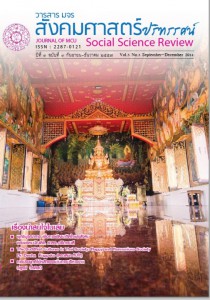การประยุกต์ใช้หลักธรรมในการบริหารงาน
บทคัดย่อ
ในปัจจุบันองค์การหรือหน่วยงานต่างๆ ต้องพึ่งการบริหารอยู่มากในบรรดากิจกรรมของมนุษย์ไม่มีสิ่งใดมากไปกว่าการบริหาร เพราะงานด้านการบริหารจะเป็นงานที่สำคัญต่อการอำนวยการให้มนุษย์ทำงานได้อย่างมีประสิทธิภาพ และประสิทธิผลมากกว่าแต่ก่อน เราจะพบว่าองค์การเกิดขึ้นและมีอยู่ในสังคมมนุษย์ทุกหนทุกแห่ง เพื่อเป็นเครื่องมือสำหรับการดำเนินกิจกรรมต่างๆ ตลอดจนความพยายามของกลุ่มคนที่มีความรู้ความสามารถความชำนาญรวมทั้งประสบการณ์ในวิชาชีพนั้นๆ แล้วรวมตัวกันขึ้น เพื่อให้บรรลุวัตถุประสงค์ขององค์การหรือหน่วยงาน ซึ่งบุคคลคนเดียว ไม่สามารถทำได้สำเร็จ หรือไม่ ย่อมขึ้นอยู่กับความสามารถของผู้ทำหน้าที่ในการบริหารในองค์การ จึงอาจกล่าวได้ว่า การบริหารเป็นสิ่งควรคู่และเกี่ยวข้องกับองค์การเสมอ และการบริหารที่ดีผู้บริหารจะต้องมีคุณธรรมและจริยธรรม และเป็นผู้ที่ทำให้ผู้ใต้บังคับบัญชาศรัทธาปสาท คือมีความเชื่อและเลื่อมใสในตัวผู้บริหาร และหลักธรรมในการบริหารมีเป็นจำนวนมาก
พระพุทธเจ้าตรัสว่า โรคมี ๒ อย่าง คือ โรคทางกาย (กายิกโรค) และโรคทางจิตวิญญาณ (เจตสิกโรค) พระองค์ทรงประกาศคำสอนเพื่อรักษาโรคทางจิตวิญญาณ และได้รับการยกย่องจากพระสาวกว่าเป็นนายแพทย์ผู้เยียวยารักษาโรคของชาวโลกทั้งปวง (สัพพโลกติกิจฉโก) ยาที่พระองค์ทรงใช้รักษาโรคก็คือ ธรรมโอสถ ในครั้งพระพุทธกาล ใครป่วยเป็นโรคทางจิตวิญญาณใด พระพุทธเจ้าทรงแสดงธรรมสำหรับรักษาโรคนั้น การฟังธรรมได้ผลชะงัดนัก แต่ในสมัยปัจจุบันที่พระพุทธเจ้าดับขันธปรินิพพานไปนานแล้ว เหลือไว้แต่ธรรมโอสถ จำนวน ๘๔,๐๐๐ พระธรรมขันธ์ ในพระไตรปิฎกใครจะนำธรรมโอสถไปใช้ก็คงต้องเลือกใช้ยาที่เหมาะสมกับโรคของตน
การรู้จักเลือกธรรมโอสถที่เหมาะสมไปใช้ในชีวิต เรียกว่า ธัมมนานูธัมมปฏิบัติ แปลว่าปฏิบัติธรรมน้อยให้คล้อยธรรมใหญ่ หมายความว่า ปฏิบัติข้อธรรมที่สอดคล้องกับจุดมุ่งหมายของเรา เช่น ถ้าเป้าหมายของเราคือเศรษฐี เราก็ต้องเลือกปฏิบัติธรรมที่ว่า หัวใจเศรษฐี หรือทิฏฐธัมมิกัตถประโยชน์ ๔ ประการ ถ้าเราต้องการความสำเร็จในชีวิต เราต้องปฎิบัติธรรมคือ อิทธิบาท ๔ ประการการเลือกข้อธรรมมาปฏิบัติเพื่อให้บรรลุเป้าหมายที่เราต้องการเช่นนี้ จัดเป็นการประยุกต์ธรรมมาใช้ประโยชน์ในชีวิตจริง คำถามที่ตามมาก็คือ เมื่อเราตั้งเป้าหมายว่าจะเป็นนักบริหารที่เก่งและดีเราควรปฏิบัติธรรมอะไรบ้าง
อาจจะพอสรุปได้ว่า ผู้บริหาร คือผู้ที่ทำงานให้สำเร็จโดยอาศัยคนอื่นเขา การบริหารงานด้วยคุณธรรม จริยธรรม ถือธรรมาธิปไตยเป็นใหญ่ ที่ยึดหลักการและความสำเร็จของงานเป็นใหญ่ จึงเป็นผู้บริหารที่นั่งอยู่ในหัวใจของคนร่วมงาน ทั้งนี้เพราะมี ความรอบรู้ด้วยอริยสัจ(๔) มีดีด้วยธรรมอุปการะมาก (๒) อุปถากด้วยทิศ(๖) ไม่วิตกด้วยปาติโมกข์(๓) สร้างโลกด้วยพรหมวิหาร(๔) ประสานด้วยมีอปริหานิยธรรม(๗) น้อมนำผลสำเร็จด้วยอิทธิบาท(๔)
เอกสารอ้างอิง
คณาจารย์สำนักพิมพ์เลี่ยงเชียง. หนังสือบูรณาการแผนใหม่ นักธรรมชั้นตรี. กรุงเทพมหานคร : เลี่ยงเชียง, ๒๕๔๖.
ศิริพงษ์ ลดาวัลย์ ณ อยุธยา. แนวคิดและทฤษฎีทางรัฐประศาสนศาสตร์. เชียงใหม่: ธนุชพริ้นติ้ง,๒๕๕๑.
ชนิสรา ศิลานุกิจ. จริยธรรมของผู้บริหารการศึกษา. กรุงเทพมหานคร : สำนักพิมพ์มหาวิทยาลัยรามคำแหง,๒๕๕๕
รัตนา กาญจนพันธุ์. จริยธรรมสำหรับผู้บริหาร. กรุงเทพมหานคร : สำนักพิมพ์มหาวิทยาลัยรามคำแหง,๒๕๕๑
สัญญา สัญญาวิวัฒน์. การบริหารจักการแนวพุทธ. กรุงเทพมหานคร : โรงพิมพ์แห่ง จุฬาลงกรณ์มหาวิทยาลัย, ๒๕๕๐.
พระธรรมปิฎก (ป.อ. ปยุตฺโต). พุทธธรรม. พิมพ์ครั้งที่ ๙ กรุงเทพมหานคร : โรงพิมพ์มหา จุฬาลงกรณราชวิทยาลัย, ๒๕๔๓. +
________ . พจนานุกรมพุทธศาสตร์ ฉบับประมวลธรรม พิมพ์ครั้งที่ ๒๒. กรุงเทพมหานคร : โรงพิมพ์ บริษัท สหธรรมิก จำกัด, ๒๕๕๔.
ราชบัณฑิตยสถาน. พจนานุกรม ฉบับราชบัณฑิตยสถาน พ.ศ. ๒๕๒๕. พิมพ์ครั้งที่ ๖. กรุงเทพมหานคร : อักษรเจริญทัศน์,๒๕๓๙.
Wira Amphansook. The application of some Buddhist princ ples for a better life and for all of your working life : the building of a great future for your life : self-study and self-taught. Bangkok : Jirayon Sangkasuwa, 2010.
P. A. Payutto., Evans, Bruce. A Constitution for living : Buddhist principles for a fruitful and harmonious life. Bangkok : Office of National Buddhism Press, 2007, c1998.
ดาวน์โหลด
เผยแพร่แล้ว
รูปแบบการอ้างอิง
ฉบับ
ประเภทบทความ
สัญญาอนุญาต
ลิขสิทธิ์ (c) 2018 วารสาร มจร สังคมศาสตร์ปริทรรศน์

อนุญาตภายใต้เงื่อนไข Creative Commons Attribution-NonCommercial-NoDerivatives 4.0 International License.
เพื่อให้เป็นไปตามกฎหมายลิขสิทธิ์ ผู้นิพนธ์ทุกท่านต้องลงลายมือชื่อในแบบฟอร์มใบมอบลิขสิทธิ์บทความให้แก่วารสารฯ พร้อมกับบทความต้นฉบับที่ได้แก้ไขครั้งสุดท้าย นอกจากนี้ ผู้นิพนธ์ทุกท่านต้องยืนยันว่าบทความต้นฉบับที่ส่งมาตีพิมพ์นั้น ได้ส่งมาตีพิมพ์เฉพาะในวารสาร มจร สังคมศาสตร์ปริทรรศน์ เพียงแห่งเดียวเท่านั้น หากมีการใช้ภาพหรือตารางหรือเนื้อหาอื่นๆ ของผู้นิพนธ์อื่นที่ปรากฏในสิ่งตีพิมพ์อื่นมาแล้ว ผู้นิพนธ์ต้องขออนุญาตเจ้าของลิขสิทธิ์ก่อน พร้อมทั้งแสดงหนังสือที่ได้รับการยินยอมต่อบรรณาธิการ ก่อนที่บทความจะได้รับการตีพิมพ์ หากไม่เป็นไปตามข้อกำหนดเบื้องต้น ทางวารสารจะถอดบทความของท่านออกโดยไม่มีข้อยกเว้นใดๆ ทั้งสิ้น





